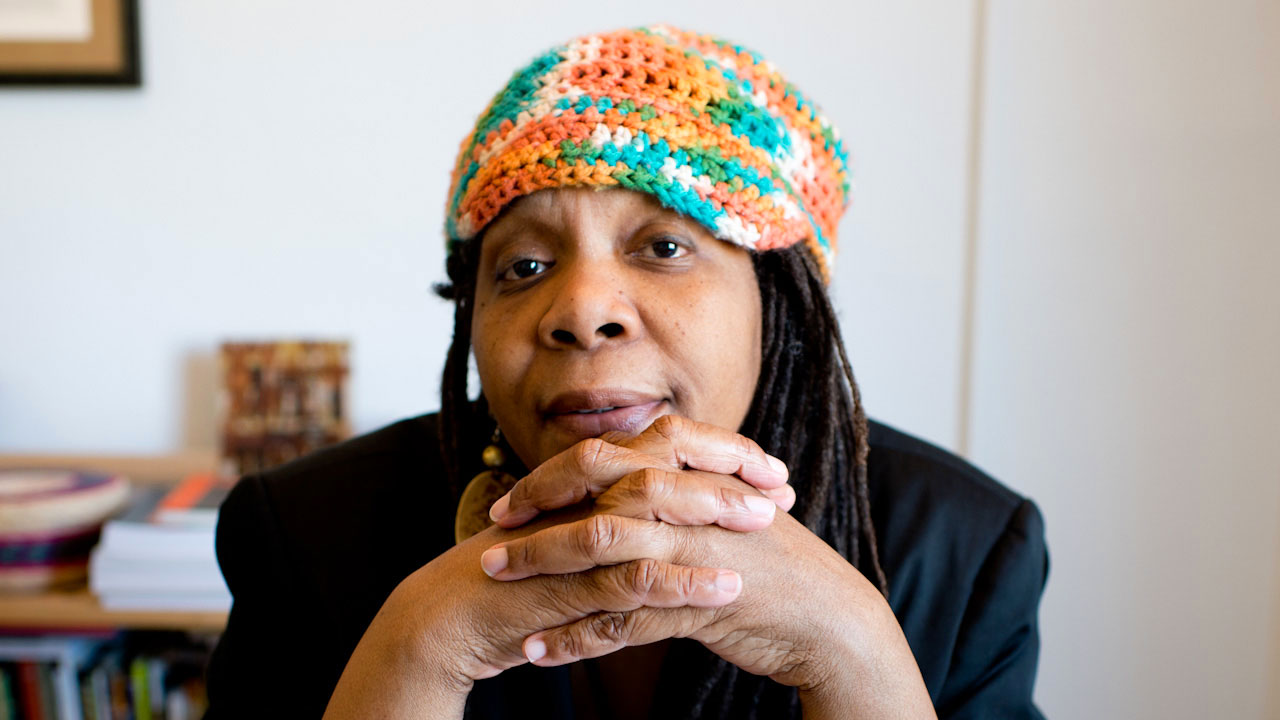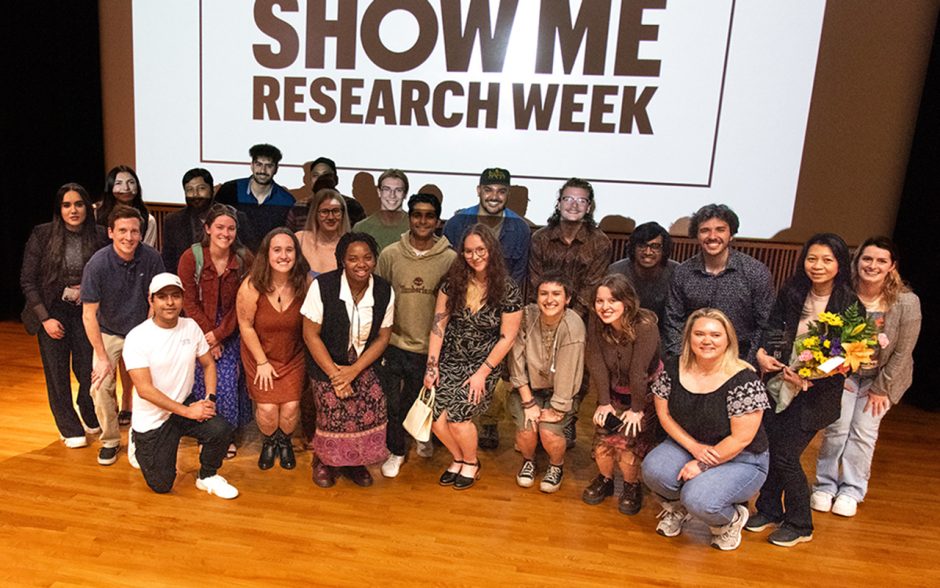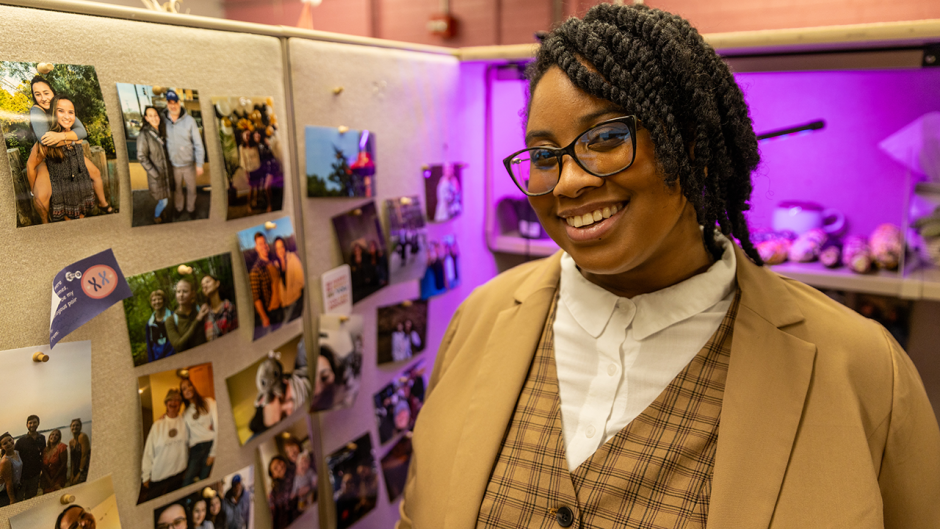Monica Hand had a perfectly good career and loved living in New York City. So what possessed her to leave an impressive position at the U.S. Postal Service to start over with a writing career at an age when most people are planning for retirement?
Hand had always wanted the freedom to write, even during her 32-year career. Now, two years after retirement and at age 59, she’s on an intellectual journey as an MU doctoral student. The course of study will take five years.
It’s all worth it to Hand because her future is in poetry, the long-standing love of her life.
“I’ve been writing poetry since I was 10, whenever I could. I nurtured it. Now I’m feeding it full time,” she says.
Hand already has a published book of poetry to her credit, a prize winner named by Coldfront as one of the top 40 poetry books of 2012. Reviewers praise me and Nina as an expression of “contemporary blues that speaks to a woman’s creative challenges.”
The Boston Review has called Hand “a mature Langston Hughes in a hat,” a designation that may make her laugh, but, in reality, she can still recite from memory the poems of Langston Hughes she learned as a child. (And she often does wear a hat.)
Hand is in a good place, literally and figuratively, as she paces herself to balance her overwhelming desire to write with doctoral responsibilities. Taking one semester at a time, she wants to feed her intellectual appetite, study and teach.
Mostly she wants the time to be a poet.
She has a dream
Hand says she retired from a career, not from life. Because every hour away from writing is a sacrifice, she gets up early, between 3 and 5 a.m., to find writing time: “I’m greedy. I’m hungry. I want it all. I want to write.”
Searching for schools, Hand knew she would have to make a major move to enter a doctoral program in creative writing. She discovered quickly that the good programs were in the Midwest, not in New York, which had been her home since 2004. It was surprisingly easy for her to leave the big city behind for a new life in a small college town, she says.
“The people and the curriculum are excellent here. I love being in this environment. I’m getting the teaching experience I needed and plenty of intellectual stimulation. And Columbia is an arty city,” she says.
Hand had dreamed of living a writer’s life for decades; she feels closer to it in academia, and she’s a standout. Among her honors, she received a Cave Canem Fellowship, which cultivates the artistic growth and professionalism of black poets. She’s also a member of the Alice James Books Cooperative Board, which gives her publishing experience through the reading of manuscripts.
At MU, surrounded by mentoring faculty members and student scholars, Hand spends her days taking courses, studying and teaching her own students.
“Teaching is a responsible profession. You have to prepare. You have to be available. Students are real-life human beings, and I want to do a good job for them,” she says.
It appears that doing a good job has been stamped into her DNA. Hand retired from the Postal Service as a mid-level manager responsible for the New York Metro area, as well as Puerto Rico and the Virgin Islands.
Before the New York post, she worked in the corporate office in Washington, D.C. In that position, she developed marketing and public relations campaigns for stamps featuring African Americans, and she designed the program for the first Breast Cancer Awareness stamp. Her other duties included issues management and crisis communication. During the 2001 anthrax mail tragedy, she worked around the clock for more than 60 days.
And as if her job weren’t enough, Hand completed her master of fine arts degree while still employed.
me and Nina
Poets typically draw from their life experiences in creating new works. Much of Hand’s poetry reflects her interest in music, which she developed during her growing-up years in Newark, N.J. Hand passed the entrance exam and earned admission to the Newark Arts High School, known for its brainiac students.
Hand’s poetry is as packed with rhythm as it is with images and ideas. She wrote the first poem for me and Nina during a writing workshop in New York. Her assignment developed into a focus on Nina Simone, a black singer-songwriter of multiple music styles, who became inspiration for Hand’s book.
Simone was someone she could identify with. Like Hand, Simone was shy and reserved. For years Hand had admired Simone’s contralto voice and her activist lyrics about race and women’s issues. Simone, who didn’t fit the Eurocentric image of beauty of the time, had wanted to play classical piano, but through the years she transformed into an African woman who epitomized the “black is beautiful” theme. Simone spoke through lyrics that were sad and angry.
Hand investigated that sadness and anger in the context of a performer caught between two major social movements of the time — civil rights and black nationalism — and what she discovered was her own emotions.
In writing her poetry, Hand organized the manuscript in the form of a Bach fugue and expanded ideas through riffs, much like a jazz performer does. The resulting book is neither a biography of Simone nor an autobiography of Hand. It is an accumulation of overlapping experiences, artfully written.
Readers will find some cultural markers in the book: issues of poverty, of being a woman, being black, being disenfranchised. “These are all universal themes. We all experience the blues, alienation, regret, the need to be touched,” Hand says.
Still growing
Hand has written a draft of a second book of poetry but says it’s most likely not her dissertation piece. She knows there’s more to come.
“I’m growing here. You write about what you’re taking in. I have to tell myself to slow down. I want to leave myself open to what the universe brings while I’m here,” she says.
Meanwhile there’s other work to be done.
In her role as research assistant to Professor Cornelius Eady, Hand organized a massive campus symposium celebrating the literary contributions of Michael S. Harper, a poet known nationally for his writing, teaching and mentoring. The public event, to be held March 14 and 15, is attracting famous poets and musicians from across the nation.
In another project, Hand teaches the art of paper bookmaking through community workshops. Using an artistic process she calls “therapeutic,” Hand creates one-of-a-kind books by hand writing the text of poems and hand stitching the bindings.
When she was a child, Hand preferred to read and visit libraries over all other activities. As an adult, she mixes her appreciation for literature with a dedication to promoting the spread of that appreciation. To support the continuation of poetry through the generations, Hand teaches the writing form to school children.
Through a paid position with WritersCorp, she offered poetry classes for sixth-grade students in Washington, D.C. public schools for several years. In Columbia, as a volunteer, she has turned children on to poetry through classes for second-grade students at Lee Elementary School.
“Young people need what poetry gives: self-expression and beauty,” she says in explanation.





